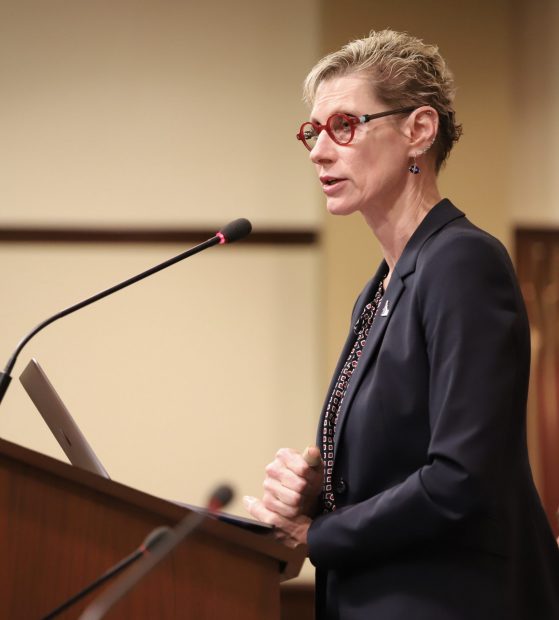(UPDATED, 3:00 p.m., with comment from Sarah Jo Fendley.)
Three years into a bitter and long-percolating lawsuit, attorneys for Boise State University and a Boise coffee shop are headed to mediation.
Ada County District Judge Cynthia Yee-Wallace ordered the mediation Friday — and set an Aug. 23 deadline.
“The parties … must participate in good faith in all aspects of the mediation,” wrote Yee-Wallace, who issued a variety of rulings in Big City Coffee’s $10 million lawsuit against Boise State.
The lawsuit, and the testy case, stems from Big City’s short-lived stint at Boise State. Big City says it was forced to close a campus location in 2020, due to student protests over owner Sarah Jo Fendley’s vocal support of law enforcement. Boise State maintains Big City left campus voluntarily.
Yee-Wallace’s mediation order could be a final attempt to settle the dispute out of court. A 10-day jury trial is still scheduled to begin on Aug. 28.
Boise State opposed mediation. But Yee-Wallace’s rulings were a mixed bag, and Boise State prevailed on other fronts. As Margaret Carmel of BoiseDev reported Monday, the rulings narrow the scope of the cases involving past and former Boise State officials.

Yee-Wallace rejected another attempt by Big City’s attorneys to name President Marlene Tromp as a defendant.
Tromp was aware of Big City’s support of law enforcement, and Tromp fielded complaints from students, but there is no evidence she took “adverse action” against the business, Yee-Wallace wrote. “Plaintiffs have failed to establish a deliberate, intentional act by Tromp to violate plaintiffs’ constitutional rights, or that she was personally involved in the constitutional violation alleged in this case.”
Tromp was listed as a defendant in the initial suit, filed in October 2021. She was dismissed from the case in April 2022.
Yee-Wallace also dismissed another defendant in the case: Francisco Salinas, the former assistant vice president for equity initiatives at Boise State. But Tromp Chief of Staff Alicia Estey and Leslie Webb, former Boise State vice president for student affairs and enrollment management, will remain as defendants, over Boise State’s objections. Yee-Wallace said it’s possible the two administrators took “adverse action” against Big City.
In a statement Friday, Boise State didn’t address specifics from the rulings — including the mediation order.
“The facts and First Amendment are on our side. When politics and personal attacks are stripped away, the evidence establishes the plaintiffs chose to leave campus and the defendants never asked anyone to compromise their First Amendment rights. We will continue to vigorously defend this case.”
Other rulings — and a glimpse into an acrimonious case
The judge’s remaining rulings addressed several other matters, from the personal to the procedural:
Sanctions. Yee-Wallace said she will consider sanctions against Michael Roe, Big City’s attorney. Boise State’s attorneys say Roe was antagonistic during a series of heated depositions, at one point throwing exhibits at the university’s legal team.
But Yee-Wallace said any costs and fees collected from Roe might be offset by sanctions against Keely Duke, Boise State’s attorney, who delayed the depositions by engaging in “unnecessary commentary” during the proceedings.
Roe did not respond to a request for comment Monday. But in a statement to Idaho Education News, Fendley defended her attorney.
“For the past three years I have fought tooth and nail against Boise State University and am only standing here today — thrilled to get my day in court — because of the support of Mr. Roe and my legal team,” she said. “While Mr. Roe has entered every interaction with opposing counsel in good faith, in his enthusiastic defense of me he has faced personal and professional attacks by opposing counsel.”
Destroyed evidence. Roe sought sanctions against Boise for “spoliation” — that is, the destruction of evidence.
Yee-Wallace denied this request on several grounds. She said it’s unclear whether Boise State administrators destroyed evidence, or when. She also said it’s unclear “whether the evidence at issue is potentially relevant.”
Subpoenas. Here, Yee-Wallace sided with Big City — somewhat. And here, she said, there is evidence that Boise State has purged data.
The Big City team made a sweeping request of all phone call logs and messages to and from Tromp, Estey, Salinas and Webb. Yee-Wallace said this request was overly broad. She told Big City’s attorneys to narrow the request to the administrators’ cellular providers — to cover eight months instead of a 17-month window.
Yee-Wallace said she saw merit in making Boise State comply with some subpoenas, “in light of the fact that defendants and Tromp have admitted deleting potentially relevant data in this case.”
Calendars. Boise State will have to produce administrators’ calendars and schedules — to an extent.
The university will have to release some calendar items, but only those that are related to the Big City dispute.
